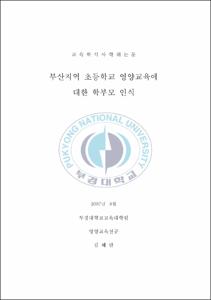부산지역 초등학교 영양교육에 대한 학부모 인식
- Alternative Title
- THE PERCEPTION OF PARENTS’ NUTRITION EDUCATION FOR ELEMENTARY SCHOOL IN BUSAN EREA.
- Abstract
- In order to present the education plan that school can offer, and the education for mothers and their children to knows by researching on the understanding and demand measures of nutrition education by social demographical features and actual status of mothers' dietary habits and nutrition knowledge level, these were studies with mothers who give a big effect on children for dietary life as the manager of the table.
The survey was conducted from December 5 to 12 2006, the data were collected by self-reported questionnaires. This research was examined on 611 mothers of the forth grade in six different elementary schools belonging to Busan District Office of Education. For the significant test between factor t-test ANOVA and Chi-square were used in the statistical analysis package of SPSS WIN 10.0.
The result of the research are as follows.
1) The children it receives a periodical nutrition education from the school the whole answer 20.5% is receiving a nutrition education, and many subjects responded that preschool years or elementary low grades are the most proper time for nutrition education for children and there are significant difference depending on education background.
In the education hours, they responded that it is proper one hour a month and there are significant difference depending on education level, whether or not the mother had a career.
The perception for a suitable person to teach the nutrition education showed school dietitian, outside professional dietitian, nurse teacher, charge teacher, parents in order and the time of that is a related class, school lunch time, discretionary activities, special activity, school broadcast, individual consultation in order.
The most mothers recognizes the necessity of nutrition education from the school very highly, the reason must execute a nutrition education growth of students, correcting for unbalance diet, prevention of chronic disease, table manner, obese, knowledge of food and nutrition in order. Importances of the contents of a nutrition education were proper eating habits, food safety, disease, food waste, health weight, method of selection food, table manner, traditional food in order and significant difference depending on social demographical features.
2) Mothers with experience in having a dietary life education were 43.9%, 86.4% of mothers wanted to get the education, there were not difference demand on social demographical feature. The mother of most does a children systematic nutrition education and significant difference by school group.
The mothers understanding effective indirect education which uses the internet or the printed matter compared to directness from the school. The most frequently used sources of the nutrition knowledge were mass media such TV, newspapers, internet and neighborhood, friends.
3) Most of the mothers had an above average knowledge about nutrition. The dietary behavior and nutrition knowledge scores of mothers influenced by general characteristics as age, education, occupation, family income. Dietary behavior score of mothers was tend to higher score with increasing nutrition knowledge level.
4) Dietary behavior·nutrition knowledge score will increase along with mother experience nutrition education and effect to frequency of teaching children frequency dietary life. The effective degree which it follows in instructional method is difference demand on dietary behavior·nutrition knowledge score.
The improvement of dietary habits and nutrition knowledge of the mothers are very important because their dietary habits and nutrition knowledge have an influence on formation of children's dietary habits. We suggest that schools open nutritional education programs for mothers in order to acquire proper nutrition information and that schools and homes should be more closely connected.
Therefore, through continuous nutritional education at home and school, the growth in the chance of a nutrition education for children and parents, especially mothers who are the manager of the table, must be carried out. In order for that, the practical development of a nutritional education program is be needed.
- Issued Date
- 2007
- Awarded Date
- 2007. 8
- Type
- Dissertation
- Publisher
- 부경대학교 교육대학원
- Alternative Author(s)
- Kim, Hye-Ran
- Affiliation
- 부경대학교 교육대학원
- Department
- 교육대학원 영양교육전공
- Advisor
- 류은순
- Table Of Contents
- Ⅰ. 서론 = 1
1. 연구의 필요성 = 1
2. 연구의 목적을 위한 가설 설정 = 6
3. 용어의 정리 = 7
가. 영양교육 = 7
나. 급지 = 7
다. 식행동 = 8
라. 영양지식 = 8
Ⅱ. 이론적 배경 = 9
1. 초등학교 영양교육의 발전동향 = 9
2. 초등학교 영양교육 실시의 필요성 = 10
3. 어머니의 영양교육 필요성 = 12
가. 인구사회학적 요인에 따른 영양교육 실시 = 12
나. 어머니의 영양지식·식행동의 차이에 따른 영양교육 실시 = 13
Ⅲ. 연구방법 = 16
1. 연구대상 및 방법 = 16
2. 연구 기간 = 17
3. 조사도구 = 17
가. 일반적 특성 = 17
나. 자녀의 영양교육실시 조사도구 = 17
다. 어머니의 영양교육 태도 조사도구 = 18
라. 어머니의 식행동 조사도구 = 18
마. 어머니의 영양지식 조사도구 = 19
4. 자료분석 = 21
Ⅳ. 연구결과 = 23
1. 대상자의 일반적 특성 = 23
2. 인구사회학적 요인에 따른 자녀 영양교육 인식 = 27
3. 인구사회학적 요인에 따른 어머니의 영양교육 경험 및 태도 = 38
4. 인구사회학적 요인에 따른 어머니의 식행동 및 영양지식 = 47
5. 어머니의 식행동 및 영양지식에 따른 자녀 영양교육 인식 = 52
6. 어머니의 식행동 및 영양지식에 따른 어머니의 영양교육 경험 및 실태 = 59
7. 어머니의 영양교육 경험 및 태도에 따른 자녀영양교육 인식 = 64
Ⅴ. 요약 및 결론 = 73
1. 요약 = 73
2. 결론 = 77
참고문헌 = 79
부록 = 84
- Degree
- Master
- Files in This Item:
-
-
Download
 부산지역 초등학교 영양교육에 대한 학부모 인식.pdf
기타 데이터 / 2.84 MB / Adobe PDF
부산지역 초등학교 영양교육에 대한 학부모 인식.pdf
기타 데이터 / 2.84 MB / Adobe PDF
-
Items in Repository are protected by copyright, with all rights reserved, unless otherwise indicated.